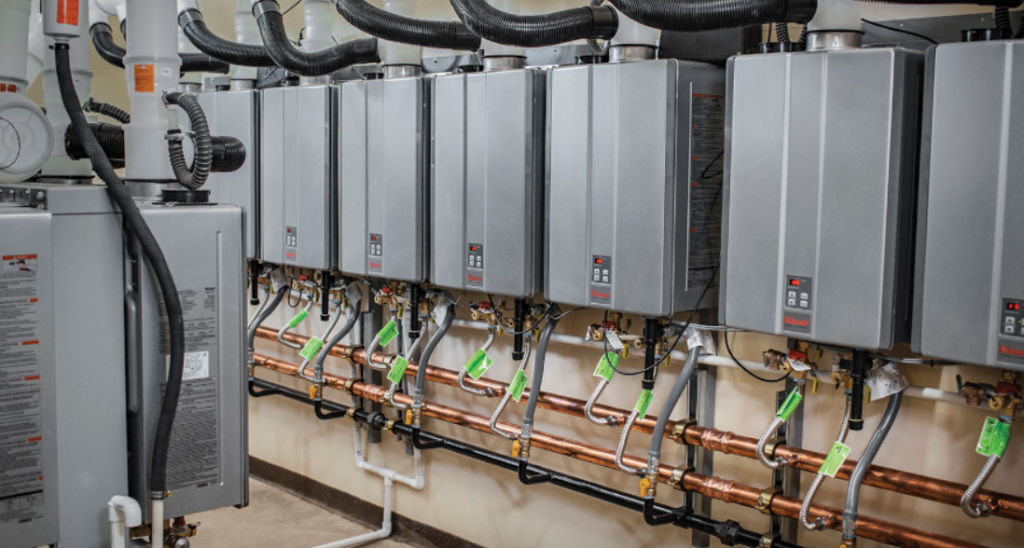In the ever-evolving landscape of commercial plumbing, businesses are increasingly turning to advanced technologies to improve efficiency and reduce operational costs. One such innovation is the commercial tankless water heater. This guide aims to provide a comprehensive overview of commercial tankless water heater installation, outlining the key benefits, considerations, and best practices to ensure a successful implementation.
Understanding Commercial Tankless Water Heaters
Commercial tankless water heaters are designed to provide on-demand hot water, heating water directly as it flows through the unit. Unlike traditional water heaters that store hot water in a tank, these systems eliminate the need for a storage tank, significantly reducing energy consumption and providing endless hot water supply. Their compact design makes them an ideal choice for various commercial settings, including restaurants, hotels, and manufacturing facilities.
Benefits of Commercial Tankless Water Heater Installation
- Energy Efficiency: One of the most significant advantages of Commercial Tankless Water Heater Installation is energy efficiency. These systems only heat water when needed, which can lead to substantial savings on energy bills compared to conventional heaters that maintain a constant temperature.
- Space Saving: The compact nature of tankless units allows for more efficient use of space. Businesses can install these systems in smaller areas, freeing up valuable floor space for other operational needs.
- Longer Lifespan: Tankless water heaters generally have a longer lifespan than traditional models. While conventional heaters may last about 10-15 years, tankless units can operate efficiently for over 20 years with proper maintenance.
- Endless Hot Water Supply: With commercial tankless water heater installation, businesses can ensure a continuous supply of hot water, meeting peak demand during busy hours without running out.
- Lower Carbon Footprint: Using energy-efficient equipment contributes to a lower carbon footprint, aligning with many businesses’ sustainability goals. This is increasingly important for companies looking to enhance their corporate social responsibility (CSR) initiatives.
Key Considerations for Commercial Tankless Water Heater Installation
While the benefits are clear, several important considerations must be addressed before proceeding with a commercial tankless water heater installation.
1. Sizing the Unit
Proper sizing is crucial for the effectiveness of a commercial tankless water heater. Underestimating the hot water demand can lead to insufficient supply during peak usage. Businesses must calculate their peak flow rates and consult with a professional to determine the appropriate unit size.
2. Location and Accessibility
Choosing the right location for installation is vital. The water heater should be placed close to the points of use to minimize heat loss and maximize efficiency. Additionally, ensure easy access for maintenance and servicing, as regular upkeep is essential for optimal performance.
3. Ventilation Requirements
Commercial tankless water heaters require adequate ventilation to operate safely. Depending on the type of unit (vented or non-vented), businesses may need to install flues or other ventilation systems to comply with local building codes and ensure safety.
4. Water Quality
Water quality can impact the efficiency and lifespan of tankless water heaters. Businesses should consider installing water softeners to reduce mineral buildup, which can lead to decreased performance and increased maintenance needs.
The Installation Process
The commercial tankless water heater installation process involves several key steps:
1. Planning and Preparation
Before installation begins, a thorough assessment of the building’s plumbing system should be conducted. This includes evaluating existing pipes, electrical systems, and gas lines (if applicable) to ensure compatibility with the new heater.
2. Professional Installation
Due to the complexity of commercial tankless water heaters, hiring a licensed professional for installation is strongly recommended. Professionals possess the necessary skills and knowledge to ensure the unit is installed correctly and efficiently, adhering to all local codes and regulations.
3. Testing and Commissioning
After installation, the system must be thoroughly tested to ensure it operates correctly. This includes checking for leaks, verifying water flow rates, and ensuring that the heater delivers hot water at the desired temperatures. Proper commissioning is essential for the long-term success of the installation.
Maintenance and Upkeep
Regular maintenance is crucial for maximizing the efficiency and lifespan of commercial tankless water heaters. Businesses should schedule annual inspections to check for scale buildup, flush the system, and ensure all components are functioning correctly.
Conclusion
Commercial tankless water heater installation presents a multitude of benefits, including energy efficiency, space savings, and an endless hot water supply. By understanding the key considerations and following best practices for installation and maintenance, businesses can ensure they make a sound investment that enhances their operational efficiency and reduces costs. As the demand for efficient hot water solutions continues to grow, the adoption of tankless systems will undoubtedly play a significant role in the future of commercial plumbing.



